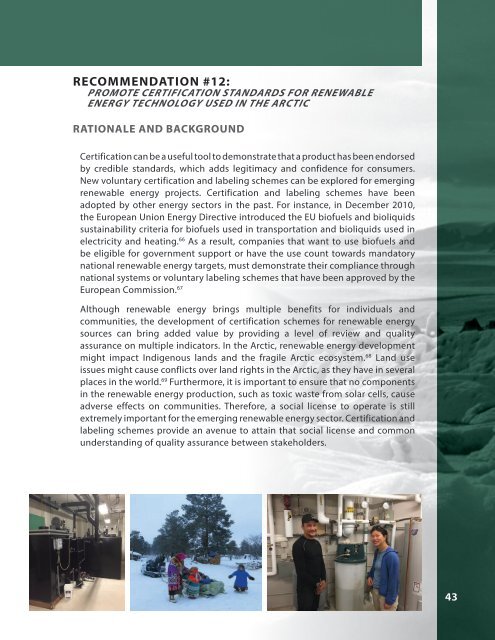DEVELOPING RENEWABLE ENERGY IN ARCTIC AND SUB-ARCTIC REGIONS AND COMMUNITIES
FulbrightArcRenewableEnergy
FulbrightArcRenewableEnergy
Create successful ePaper yourself
Turn your PDF publications into a flip-book with our unique Google optimized e-Paper software.
RECOMMENDATION #12:<br />
PROMOTE CERTIFICATION ST<strong>AND</strong>ARDS FOR <strong>RENEWABLE</strong><br />
<strong>ENERGY</strong> TECHNOLOGY USED <strong>IN</strong> THE <strong>ARCTIC</strong><br />
RATIONALE <strong>AND</strong> BACKGROUND<br />
Certification can be a useful tool to demonstrate that a product has been endorsed<br />
by credible standards, which adds legitimacy and confidence for consumers.<br />
New voluntary certification and labeling schemes can be explored for emerging<br />
renewable energy projects. Certification and labeling schemes have been<br />
adopted by other energy sectors in the past. For instance, in December 2010,<br />
the European Union Energy Directive introduced the EU biofuels and bioliquids<br />
sustainability criteria for biofuels used in transportation and bioliquids used in<br />
electricity and heating. 66 As a result, companies that want to use biofuels and<br />
be eligible for government support or have the use count towards mandatory<br />
national renewable energy targets, must demonstrate their compliance through<br />
national systems or voluntary labeling schemes that have been approved by the<br />
European Commission. 67<br />
Although renewable energy brings multiple benefits for individuals and<br />
communities, the development of certification schemes for renewable energy<br />
sources can bring added value by providing a level of review and quality<br />
assurance on multiple indicators. In the Arctic, renewable energy development<br />
might impact Indigenous lands and the fragile Arctic ecosystem. 68 Land use<br />
issues might cause conflicts over land rights in the Arctic, as they have in several<br />
places in the world. 69 Furthermore, it is important to ensure that no components<br />
in the renewable energy production, such as toxic waste from solar cells, cause<br />
adverse effects on communities. Therefore, a social license to operate is still<br />
extremely important for the emerging renewable energy sector. Certification and<br />
labeling schemes provide an avenue to attain that social license and common<br />
understanding of quality assurance between stakeholders.<br />
43


